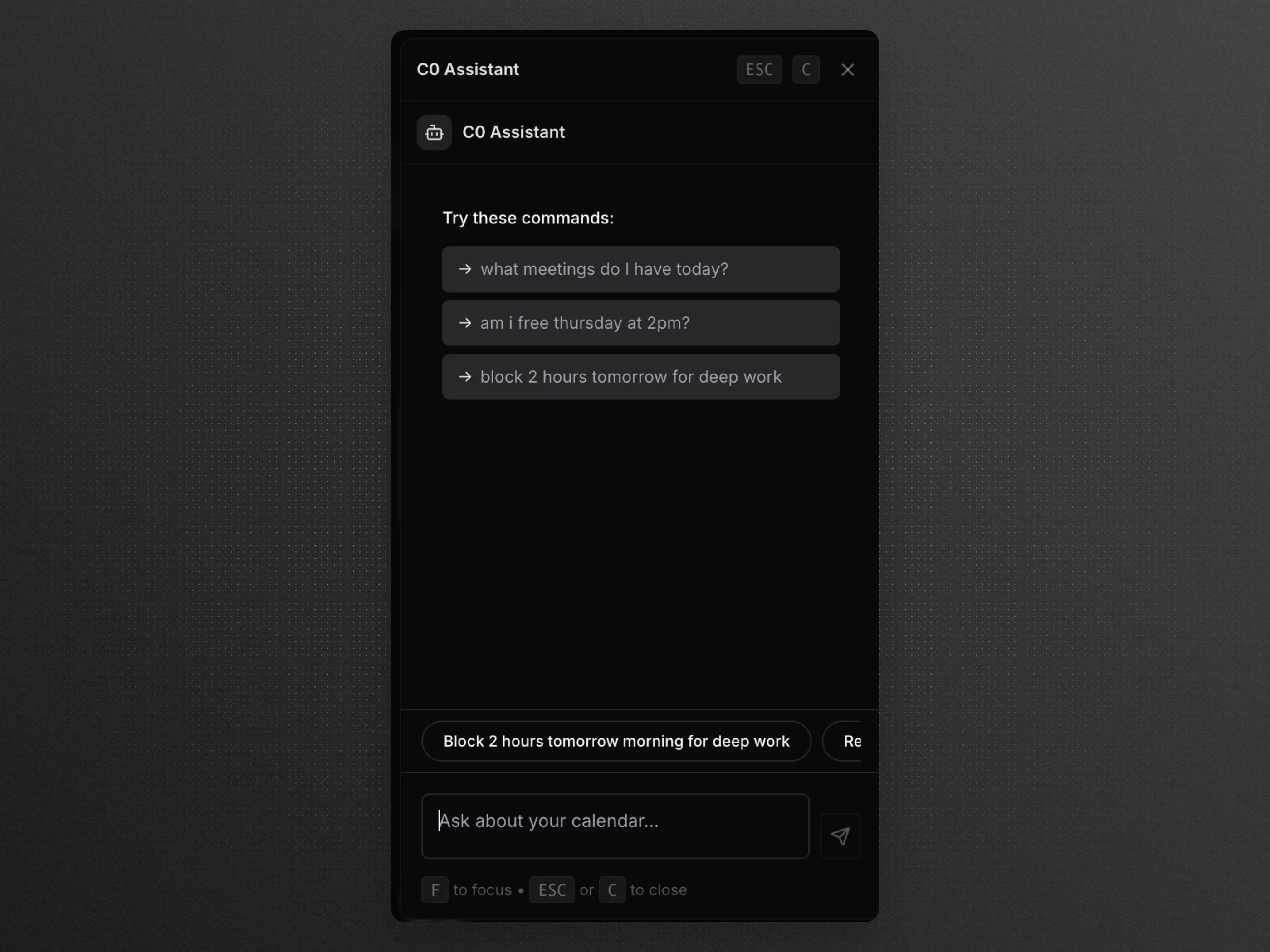Natural Language Tips
Master the AI assistant with best practices for natural language commands
How the AI Assistant Works
Calendar0's AI assistant understands natural language and can help you:
- Create and edit calendar events
- Check your availability
- Find free time slots
- Reschedule meetings
- Add attendees and meeting details

Writing Effective Commands
Be Conversational
Write like you're talking to a person, not a computer:
Good examples:
- "Schedule lunch with Sarah tomorrow at noon"
- "What's on my calendar today?"
- "Move my 3pm meeting to Thursday"
Avoid robotic commands:
- "CREATE_EVENT lunch 2024-01-15 12:00"
Include Key Details
The more specific you are, the better the results:
Essential details:
- Time - "tomorrow at 2pm" or "Friday afternoon"
- Duration - "for 30 minutes" or "1 hour meeting"
- Attendees - "with john@company.com"
- Location - "at the office" or "via Zoom"
Examples by Specificity
Minimal (works, but AI may ask for clarification):
"Meeting with team tomorrow"
Better (includes time):
"Team meeting tomorrow at 10am"
Best (includes all details):
"Team standup tomorrow at 10am for 15 minutes with team@company.com"
Common Patterns
Creating Events
Simple events:
"Dentist appointment next Tuesday at 3pm"
Recurring events:
"Team standup every Monday at 9am"
All-day events:
"Mark next Friday as PTO"
Events with attendees:
"1-on-1 with Alex tomorrow at 2pm for 30 minutes"
Checking Availability
Today:
"What's on my calendar today?"
Specific day:
"Am I free Thursday afternoon?"
Range:
"When am I free this week?"
Finding slots:
"Find me 2 hours for deep work this week"
Editing Events
Reschedule:
"Move my 3pm meeting to tomorrow"
Change duration:
"Make my lunch meeting 1 hour instead of 30 minutes"
Add attendees:
"Add sarah@company.com to tomorrow's standup"
Cancel:
"Cancel my 2pm meeting today"
Time References
The AI understands various time formats:
Absolute times:
- "January 15 at 2pm"
- "2024-01-15 14:00"
- "Tuesday at 3:30pm"
Relative times:
- "tomorrow"
- "next week"
- "in 2 hours"
- "this Friday"
Informal times:
- "morning" (typically 9am-12pm)
- "afternoon" (typically 1pm-5pm)
- "evening" (typically 6pm-9pm)
- "lunch time" (typically 12pm-1pm)
Best Practices
1. Break complex requests into steps
For complicated scheduling:
Instead of:
"Schedule a meeting with the entire team next week when everyone is free for 2 hours"
Try:
1. "When is everyone free next week?"
2. [Review options]
3. "Schedule 2-hour meeting with team@company.com on Tuesday at 2pm"
2. Use follow-up questions
The AI maintains context:
You: "What's on my calendar tomorrow?"
AI: [Shows events]
You: "Cancel the 3pm one"
AI: [Cancels the 3pm event]
Common Questions
"The AI didn't understand me"
Try:
- Being more specific with times and dates
- Using complete email addresses
- Breaking the request into smaller steps
- Rephrasing using simpler language
"The event was created in the wrong calendar"
- Set your default calendar in Settings → Calendars
"The AI suggested a conflicting time"
- The AI checks availability, but:
- Make sure all calendars are connected
- Some calendars may not be synced yet
- You can manually adjust the time
Advanced Tips
Batch operations
Handle multiple events:
"Show me all meetings with John this month"
"Cancel all my meetings on Friday"
Natural queries
The AI understands context:
"When's my next meeting?"
"How long until my next call?"
"What time do I finish today?"
Next Steps
- Scheduling Meetings - Advanced meeting scheduling techniques
- Finding Time - Learn how to check availability efficiently
- Managing Events - Edit, reschedule, and cancel events
- Examples - See more real-world examples